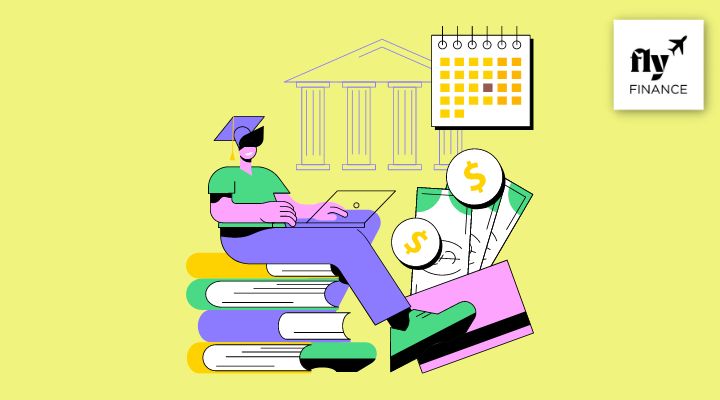Every year thousands of students from India plan to study abroad but are worried about the financial expense. However, there is an easy solution to this worry. Student loans are one of the easiest ways to fund your higher education abroad. These days there are many loan options that a student can explore. These options provide various benefits and students can select them depending on their needs, preferences, loan amount and repayment methods. Students commonly prefer federal loans or private loans. And if you wish to know more about them, continue reading the blog on Federal Vs Private Student Loans.
Table of contents
Federal Vs Private Student Loans – Which is Better?
The following are some of the pointers you must consider before deciding on the best available options:
Benefits of Federal Loan
- They offer fixed interest rates for the life of the loan
- It provides various repayment assistance options (including income-based repayment)
- It also offers subsidised loans for those who demonstrate the need
Benefits of Private Student Loan
- They may offer lower interest rates depending on your co-signers credit rate and income
- Some also offer fixed interest rates and higher borrowing limits
- They do not require you to demonstrate any financial need
Federal Vs Private Student Loans – Definition
There are two types of student loans that are commonly preferred namely federal student loans and private student loans:
The federal government made and directly funds federal student loans. Students who wish to apply for these loans are required to complete the Free Application for Federal Student Aid (FAFSA)
On the other hand, private lenders such as online lender and banks made and funds private student loans. These loans are also referred to as alternative or non-federal loans.
Also Read: Loans to Study Abroad
Federal Vs Private Student Loans – Types
The following are the types of both federal and private loans:
Types of Federal student loans
- Direct Subsidised Loans – These loans are for undergraduate students who have financial needs and the recipient of the loan is not responsible for repaying the interest charges on the loan during the time they are in school.
- Direct Unsubsidized Loans – These loans are for both undergraduate and graduate students who demonstrate the eligibility requirement. However, in this type of loan, there is no requirement of demonstrating financial need
- Perkins Loans – These loans are provided for both undergraduate and graduate students who demonstrate exceptional financial needs
- Direct Plus Loans – These loans acne be availed to eligible graduate students and parents as well.
Types of Private Student Loans
- Private Undergraduate Student Loans – These loans function similarly to other types of private loans in which your ability to repay the loan will be determined after your credit and income report. This may also affect the interest rate of your loan. However, many undergraduates may not have established a credit history or have a steady income, they often need a co-applicant for the loan.
- Private Parent Student Loans – Some private lenders also offer parent loans. Generally, the parents or guardian who is helping a student to pay for school take this loan. Legally, the student is not responsible for paying the parent’s loans.
- Private Graduate Loans – These loans also work in a similar manner to other types of private student loans. For this loan, a graduate may require a co-signer or have a parent or guardian take the loan for them. In case the graduate student has a solid credit history then they may qualify for the loan individually for a lower interest rate.
Eligibility Criteria of Federal Vs Private Student Loans
The following are the eligibility criteria for both federal and private loans:
Eligibility for Federal Student Loan
To apply for a federal student loan via FAFSA, the candidate must meet the basic requirements of the Department of Education. There could be additional requirements depending on the type of federal loan the student wishes to pursue.
Eligibility for Private Student Loan
These student loans generally require a co-signer as many students have limited credit history and not a steady income. A co-signer can be a parent or any other family member who has established credit and income and agrees to take equal responsibility to repay the loan if the student borrower is unable to do the same or fails to do it.
Also Read: Types of Education Loan for Indian Students
Repayment plans
The following are the repayment plans for the loan options:
Federal Loan Repayment Plans
In the case of federal loans, the Department of Education (DOE) sets all the terms for repayment. The DOE has programs which can help to lower or erase your monthly payments or even extend the repayment period if you are unable to make monthly payments.
- Income-Based Repayment – With this repayment plan, your monthly payment plan is capped based on the percentage of your discretionary income along with the remaining debt of the loan forgiven after a specified number of years (usually 20 to 25 years depending on IBR)
- Forbearance and Deferment Options – These terms refer to a period during which the monthly payments of your federal student loan are postponed or reduced due to circumstances such as financial hardships
- Loan Forgiveness – Sometimes, this is also referred to as “discharge or cancellation”. These terms through are interchangeable but are used in different situations that are eligible for complete loan forgiveness
Private Student Loans Repayment Plans
Many private loan lenders offer payment assistance if the student needs but, but the options are limited. The following are some of the commonly used repayment plans:
- Interest Only – In this plan, you only have to make payments of the interest charge for the first two years of the repayment tenure of your loan
- Interest Plus – In this method, you are required to pay for the monthly amount you determine for the first two years of the repayment tenure along with the interest payments.
- Full Principal and Interest – You start repaying the principal amount along with interest right away.
Also Read: Education Loan Insurance
FAQs
The federal government made and directly funds federal student loans. Students who wish to apply for these loans are required to complete the Free Application for Federal Student Aid (FAFSA)
These student loans generally require a co-signer as many students have limited credit history and not a steady income. A co-signer can be a parent or any other family member who has established credit and income and agrees to take equal responsibility to repay the loan if the student borrower is unable to do the same or fails to do it.
The following are some of the commonly used repayment plans:
Interest Only – In this plan, you are only required to make interest-only payments for the first two years of the repayment tenure of your loan
Interest Plus – In this method, you are required to pay for the monthly amount you determine for the first two years of the repayment tenure along with the interest payments.
Full Principal and Interest – You start repaying the principal amount along with interest right away.
This was all about Federal Vs Private Student Loans. Visit Fly. Finance to know more about such topics.





























